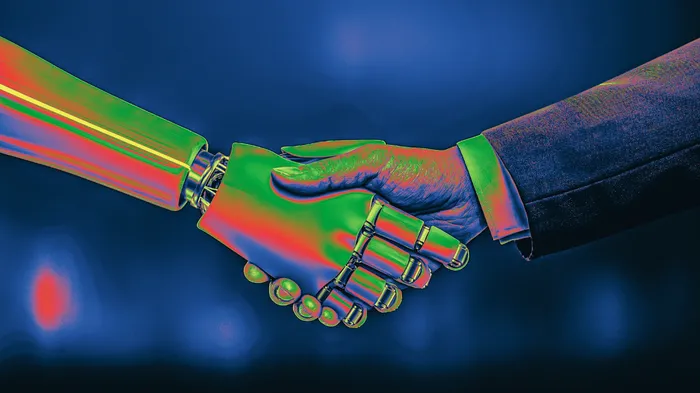Words on wealth: financial advice, AI and the human touch

Explore how AI is reshaping the financial advice landscape, enhancing the adviser-client relationship while emphasising the importance of human interaction. Discover insights from industry experts on maintaining personal connections in a tech-driven world.
Image: Freepik
About a decade ago, the financial services world was abuzz with the concept of robo-advice – financial advice provided by a “bot” on an online platform. Basically, you could punch in details such as your income, savings, expected retirement date, and risk profile, and the bot would do the calculations, select a handful of appropriate investment products, and present you with a rudimentary financial plan.
Robo-advice was not designed for higher earners with more complex financial affairs; it was just your regular middle-class worker whose finances were relatively straightforward and who needed a basic investment plan at low cost. In other words, the mass market.
At the time, it was thought that robo-advice would dramatically change the financial advice landscape and that many advisers would end up out of a job.
That’s not how things worked out. There is a trend among younger generations to “do it yourself” when it comes to investing, and they are investing directly on trading platforms and bypassing any type of adviser, human or otherwise. But for people who want advice, the advisory community remains robust.
Although advisers are relying increasingly on technology and artificial intelligence, the human element has not declined. If anything, it has come to the fore. That’s because technology has actually driven a welcome change in the adviser’s role: from mainly a financial-product-recommendation person to mainly a people person.
AI in financial advice
At the recent annual Morningstar Investment Conference in Cape Town, Dr Danielle Labotka, behavioral scientist at Morningstar Research Services, gave an insightful presentation titled “Delivering human touch for clients in a tech-forward world”. Although directed at the audience of financial advisers, Labotka’s observations apply more broadly to a wide range of services where technology is threatening functions performed until now by humans.
She said that technology, including generative AI, can enhance the adviser-client relationship by taking over the mundane, mechanical, and even some creative functions of the job, freeing up the adviser to spend more time with clients. There is a danger, however, that, if used inappropriately, it can harm the relationship, and advisers need to guard against this.
Morningstar research shows that clients of financial advisers value the human touch. Respondents rated the various qualities of their advisers as follows, from highest to lowest:
- Provides advice I can rely on. My adviser has the relevant skills and knowledge; evaluates research on investment options for me; and resolves my needs by providing personalised recommendations.
- Helps me reach my financial goals. The adviser helps me brainstorm and identify my financial goals and provides advice and services that help me reach those goals.
- Keeps me on track. Reviews my financial behaviour and helps me act in ways beneficial to my finances.
- Maximises returns. Helps me to maximise my investment returns.
Labotka said that because clients value dealing with a human, advisers need to use AI in a human way, not in ways that dehumanise the relationship. Consumers care about why an adviser is using AI and are not comfortable with every way they use it. “Clients need to see that AI is positive, not just a shortcut to doing less work,” Labotka said.
Responses from clients included negative comments, such as “It shows a lack of personal connection”; “They are providing an added service here with the recommendations, but they don't know me”; and “It seems to be a shortcut to do less work but also lowers the quality.”
Security and privacy are essential – clients want advisers to have guardrails in place when using AI, including ensuring that it is not sharing their personal information with third parties and that its decisions or recommendations are unbiased and reviewed or checked by a human.
Labotka’s takeaways from the research for advisers (and, in my view, for practitioners in other fields) were:
- Let AI complement your human value, not replace it.
- Don’t use AI as a shortcut to building and maintaining a relationship.
- Take time to clarify procedures and safeguards for using AI in your practice.
AI prognostications
Lebotka’s talk gave me an inkling of how AI might shape our lives and how our children’s lives will be affected. I have also watched videos by people across the spectrum, from doomsayers who believe robots will rule the world to tech visionaries who see a utopian future. The truth, as usual, will probably lie somewhere in between.
In the foreseeable future, at least, AI will certainly be massively disruptive regarding certain types of jobs, in a similar way to how digital technology made redundant jobs in factories producing audio tape or fax machines, but on a far larger scale. Jobs involving rigid procedures where automation or AI can replace a human’s output and improve on it are most at risk. On the other hand, jobs involving human relationships are less likely to be negatively affected if the focus is on using AI as a tool to enhance those relationships.
I believe that developing soft people skills may, as the AI revolution unfolds, be as important, if not more important, than accumulating technical know-how. Let’s see if I am right.
* Hesse is the former editor of Personal Finance.
PERSONAL FINANCE